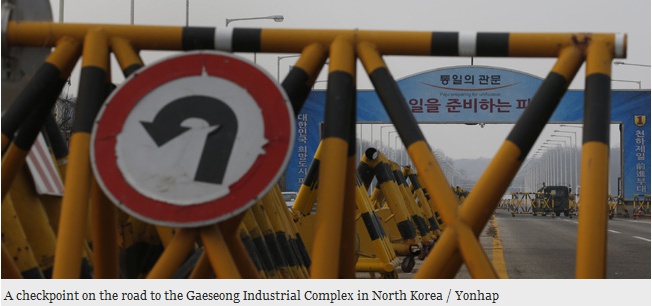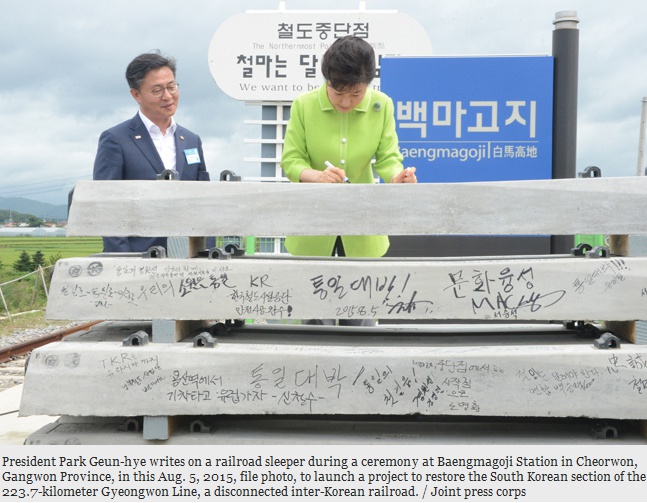Press Release

By Kang Seung-woo
President Park Geun-hye's "unification bonanza" initiative seems to be losing momentum, especially as inter-Korean relations became tense again after North Korea's fourth nuclear test.
What's worse, the decreasing public support for the vision, as well as neighboring countries' policies toward the repressive state is not helping her push ahead with the ambitious plan.
In her New Year's News press conference in 2014, Park said Korean unification would be an economic bonanza not only for the two Koreas but also for allies and neighboring countries. Since then, accompanied by her trust-building process on the Korean Peninsula designed to help pave the way for unification, the initiative has served as the backbone of her unification policy.
However, Pyongyang's unexpected nuclear test on Jan. 6 has strained relations between the two Koreas and holding up inter-Korean humanitarian cooperation. In addition, her little remaining time in office is casting a cloud over the unification vision amid growing tensions. She has just entered her fourth year in office, and her tenure is scheduled to end in early 2018.
"The North Korean nuclear test has made inter-Korean reconciliation during Park's term impossible," said Cheong Seong-chang, a senior analyst at the Sejong Institute, a local think tank.
"The nuclear test is also the North's rejection of President Park's unification program and diplomacy, urging the South Korean government to give up on its efforts and come forward for unconditional dialogue with the North."
Seoul has used a "stick-first, carrot-later" policy to urge the Kim Jong-un regime to show its commitment to abandoning its nuclear weapons program before receiving the South's economic support.
However, the nuclear provocation has left the Park government with few options for bettering its ties with its northern neighbor. The nuclear test dealt a heavy blow to Park's initiative as well, especially as the alleged hydrogen bomb test was conducted one day after Park called on Cabinet officials to make efforts to improve inter-Korean relations.
"The nuclear test is a disaster caused by the unification bonanza initiative," said Chang Yong-seok, a senior researcher at the Institute for Peace and Unification Studies at Seoul National University.
"The initiative depends on the collapse of the North Korean regime and the absorption of its political and economic systems; but it is not a good idea to just wait for the North to crumble without doing anything, such as inter-Korean exchanges and cooperation," he said.
"Such an approach, which is similar to the U.S. strategic patience policy, has led to the nuclear test. As part of its preventive measures, the South should have taken a strategic approach to the North, but it just stood idly by."
He added: "Under the current situation, where a peaceful coexistence is required between the two Koreas, Korean unification appears to be moving further away."

Pyongyang has denounced Park's unification drive as an attempt to absorb the reclusive country.
Unlike in her New Year's addresses in 2014 and 2015, Park did not mention "unification" and "dialogue" with the North in her New Year's press conference earlier this month.
In the wake of the nuclear test and the steady escalation of cross-border tensions, South Koreans are becoming less supportive of the unification vision. According to a poll by the independent think tank East Asia Institute, Monday, support for President Park's unification bonanza initiative has fallen across the board as of last year.
Among people in their 20s, support fell to 32.4 percent in 2015 from 45.6 percent the year before. For those in their 50s, support backtracked 11.2 percentage points to 50.5 percent. Numbers for people in their 40s and 30s were down about 7 percentage points during the one-year period to 49.7 percent and 37.7 percent, respectively. Even among people in their 60s, who generally agree with Park's initiatives, support for her vision for unification and its possible benefits dropped 1.9 percentage points to 60.5 percent.
The survey also showed that 41 percent of respondents believed the North to be the South's enemy, a big increase from 15.3 percent in 2005 and 31.9 percent in 2010.
Some say the U.S. pursuit of strategic patience, which entails no engagement with the reclusive state, prevents the South Korean government from reaching out to the North.
Analysts said the nuclear test is the North's way of urging the U.S. to give up its strategic patience policy and return to dialogue.
In addition, after South Korea reached a deal with Japan with regard to the "comfort women" issue late last year, the trilateral alliance between Seoul, Tokyo and Washington in handling the North Korean nuclear tests got back on track.
"In a situation where the U.S. government has not done much to change the current course of the North's nuclear program, it is not easy for the South to hold talks with the North first," said a diplomatic expert who requested anonymity.
In addition, a U.S. expert on Northeast Asian affairs challenged Park's theory that the unification will economically benefit the two Koreas and neighboring countries.
"China will want to continue to own all of the property Chinese companies have purchased in North Korea, which will undermine President Park's bonanza," said Bruce Bennett, a senior defense analyst at the RAND Corp., in November.